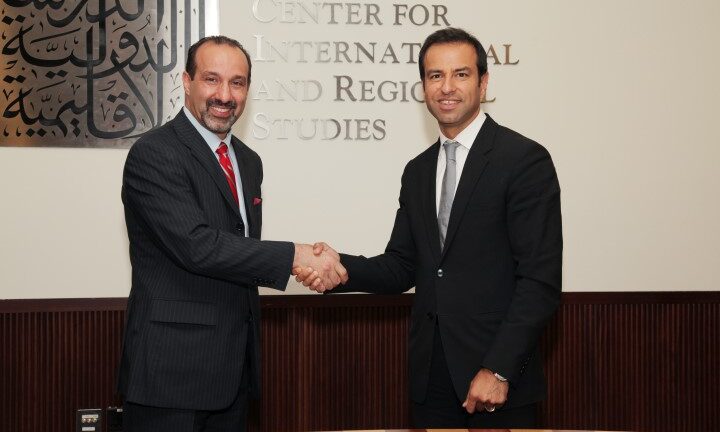American Studies, Dialogue Series, Race & Society, Regional Studies
Libya and the International Community: The Way Forward

CIRS began its 2011-2012 lecture series with a Focused Discussion on “Libya and the International Community: The Way Forward” given by the Director of Brookings Doha Center, Salman Shaikh, on September 13, 2011. During the lecture, Shaikh outlined some significant ways in which the Libyan uprising differs from others in the region and the lessons that can be learned from the success the rebel movement has had in gaining international support. “One very important lesson that we did learn – very different from Iraq – was the importance of moving with international legality. That is why I place such emphasis on UN resolutions – something we didn’t work through satisfactorily in the Iraq case,” he commented.
The Libyan revolution, which began in February 2011, followed on from other uprisings in the Arab world. Shaikh argued that “Tunisia and Egypt, in particular, acted as a catalyst for unprecedented courage being exhibited by Libyans themselves in throwing off the despotic rule of Muammar Qaddafi for 41 years.” What sets this particular revolution apart from neighboring ones, however, is that it had the backing of the international community through United Nations resolution 1970, which refers Qaddafi to the International Criminal Court and resolution 1973, which sanctioned a “no-fly zone” over Libyan air space. The United States was instrumental in setting up the no-fly zone and, yet, he explained, the US government has been successful at maintaining some distance from any active engagement in the fighting so as not to be seen supporting yet another war in the Arab world.
Shaikh argued that the GCC states and the Arab League paved the way for other nations to join the coalition against Qaddafi and galvanized the opposition. Such support for the fall of the regime, he said, countered the hesitancy exhibited by Russia and China to get involved in council action. The GCC and the Arab League called for the international community to support the rebels and oppose Qaddafi. Other actors who have a direct stake and play a significant role in the changes currently taking place in Libya include NATO, the United Nations, and the African Union. Yet, Shaikh pointed out, it is not only countries and governments that support the ousting of Qaddafi and give legitimacy to the rebel movement, as the majority of civilians in the region also gave their backing. Importantly, he said, whether through the media or on the ground, “we didn’t see a single significant protest in the Arab world against the military intervention in Libya. Very different again to what we saw regarding the Iraq case.”
Concluding with some thoughts on what needs to be done for a smooth transition of leadership in Libya, Shaikh described the roles that need to be filled and the actions that need to be taken in the near future. “I suspect that there is no real appetite from NATO member states to have real ‘boots on the ground,’” he said. However, Shaikh continued, Libyans will need assistance in other areas, such as technical assistance in terms of policing and demobilization of fighters. It will also need support in constitution and electoral reformation as well as ensuring the socioeconomic welfare of the people.
An area that needs much attention during the transition is in terms of reconciliation. “It is interesting to note,” Shaikh said, “that Libya is a fairly homogenous society in terms of its ethnic and sectarian make-up, but, of course, it is a tribal society.” Thus, there needs to be real inclusivity and representation in decision-making regarding any changes made at a governmental level. He argued that “putting in a timetable for speedy elections or for a quick constitution-making process is not a panacea. This requires a much larger process of national dialogue and reconciliation.”
Salman Shaikh is the Director of the Brookings Doha Center and a Fellow at the Saban Center for Middle East Policy in Washington, DC. Shaikh has held numerous posts of significance both in the international system and the Middle East. In particular, he worked with the United Nations for nearly a decade, primarily on Middle East policy, as the special assistant of the UN Special Coordinator for the Middle East Peace Process and as political adviser to the UN Secretary General’s Personal Representative for Lebanon during the 2006 war. He also served as the Director for Policy and Research in the Office of Her Highness, Sheikha Mozah Bint Nasser Al-Missned, the Consort of the Emir of Qatar.
Article by Suzi Mirgani, CIRS Publications Coordinator